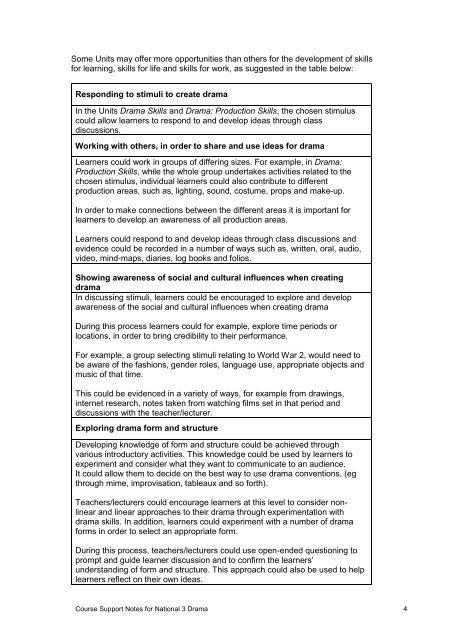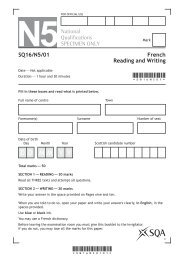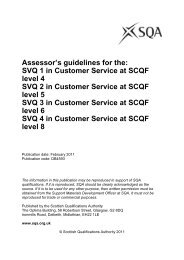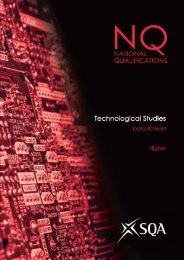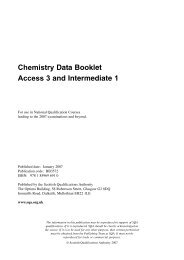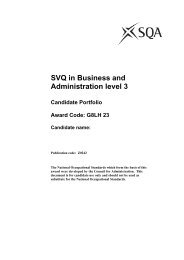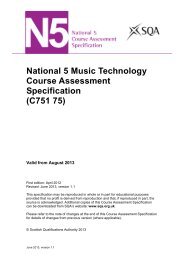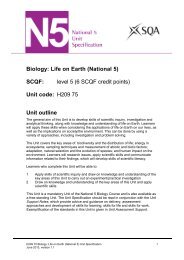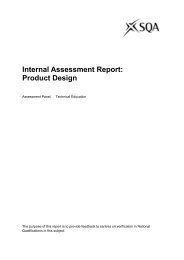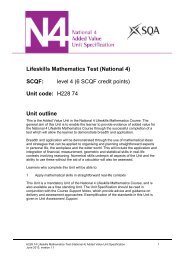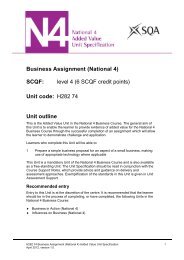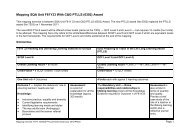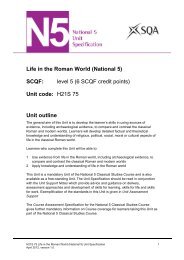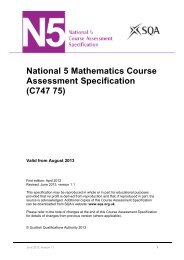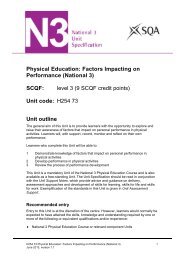National 3 Drama Course Support Notes - Scottish Qualifications ...
National 3 Drama Course Support Notes - Scottish Qualifications ...
National 3 Drama Course Support Notes - Scottish Qualifications ...
Create successful ePaper yourself
Turn your PDF publications into a flip-book with our unique Google optimized e-Paper software.
Some Units may offer more opportunities than others for the development of skills<br />
for learning, skills for life and skills for work, as suggested in the table below:<br />
Responding to stimuli to create drama<br />
In the Units <strong>Drama</strong> Skills and <strong>Drama</strong>: Production Skills, the chosen stimulus<br />
could allow learners to respond to and develop ideas through class<br />
discussions.<br />
Working with others, in order to share and use ideas for drama<br />
Learners could work in groups of differing sizes. For example, in <strong>Drama</strong>:<br />
Production Skills, while the whole group undertakes activities related to the<br />
chosen stimulus, individual learners could also contribute to different<br />
production areas, such as, lighting, sound, costume, props and make-up.<br />
In order to make connections between the different areas it is important for<br />
learners to develop an awareness of all production areas.<br />
Learners could respond to and develop ideas through class discussions and<br />
evidence could be recorded in a number of ways such as, written, oral, audio,<br />
video, mind-maps, diaries, log books and folios.<br />
Showing awareness of social and cultural influences when creating<br />
drama<br />
In discussing stimuli, learners could be encouraged to explore and develop<br />
awareness of the social and cultural influences when creating drama<br />
During this process learners could for example, explore time periods or<br />
locations, in order to bring credibility to their performance.<br />
For example, a group selecting stimuli relating to World War 2, would need to<br />
be aware of the fashions, gender roles, language use, appropriate objects and<br />
music of that time.<br />
This could be evidenced in a variety of ways, for example from drawings,<br />
internet research, notes taken from watching films set in that period and<br />
discussions with the teacher/lecturer.<br />
Exploring drama form and structure<br />
Developing knowledge of form and structure could be achieved through<br />
various introductory activities. This knowledge could be used by learners to<br />
experiment and consider what they want to communicate to an audience.<br />
It could allow them to decide on the best way to use drama conventions, (eg<br />
through mime, improvisation, tableaux and so forth).<br />
Teachers/lecturers could encourage learners at this level to consider nonlinear<br />
and linear approaches to their drama through experimentation with<br />
drama skills. In addition, learners could experiment with a number of drama<br />
forms in order to select an appropriate form.<br />
During this process, teachers/lecturers could use open-ended questioning to<br />
prompt and guide learner discussion and to confirm the learners’<br />
understanding of form and structure. This approach could also be used to help<br />
learners reflect on their own ideas.<br />
<strong>Course</strong> <strong>Support</strong> <strong>Notes</strong> for <strong>National</strong> 3 <strong>Drama</strong> 4


